Can Low Libido Be Treated?
Are you suffering from low libido and secretly wondering if low libido can be treated? Well, happily, the answer is yes! There are different ways to treat low libido. The best treatment for you will depend on the underlying cause of your low libido.
What is Low Libido?
Low libido is when you just don’t have much interest in sexual activity of any kind. It’s a more common problem than you would think. It can affect women of all ages. In fact, up to 43% of women experience low libido at some point in their lives (The Journal of Sexual Medicine 2010).

What are the Causes of Low Libido?
- Medical: Depression, anxiety, chronic disease, chronic pain or menopause-related issues.
- Medications: Antidepressants, birth control, blood pressure medications and antihistamines.
- Stress: Stress is a well-known libido-killer.
- Psychological: Self-esteem and body image issues.
- Relationship: Conflict, sexual boredom, abuse or just not feeling safe.
Sexual Desire Can Be Complex
A lot of factors are involved, from your physical and emotional health, stress, traumatic events, to lifestyle habits, hormonal changes and the health of your relationship. Sex drive can have its ups and downs over time, but low libido should not be an ongoing issue.
Can Low Libido be Treated?
Treatment for low libido depends on the root cause(s).
If your low libido is medical in nature, you can work with your doctor to treat the underlying condition. If your low libido is caused by a medication, your doctor can change your medication to one without this side effect. If your low libido is caused by stress or psychological issues, try therapy. If the relationship with your partner is the cause, then it might be time to re-evaluate things and try couples or relationship therapy for help.
What Treatments are Available?
Low libido can be treated. The best treatment depends on the reason for your low libido.
Hormonal Treatments
The reproductive hormones, estrogen, testosterone and others, can impact your interest level in sex. For example, estrogen can help for menopause-related low libido. Raising estrogen levels, which fall at this time of life, can help with dryness and making sex more comfortable. But estrogen doesn’t help if it’s simply a question of no desire for sex. Then you need to look to other treatments.
Come see us at The Libido Doctor to assess if estrogen will help in your situation.
The male hormone testosterone affects sexual function in women. Women have much lower amounts of testosterone than men. It is sometimes prescribed to raise libido. But using testosterone is controversial and can have side effects like acne, excess body hair or mood changes.
Vaginal dryness is a symptom of menopause. DHEA can help if the problem is due to severe vaginal dryness associated with menopause.
A vaginal insert can deliver DHEA direct to the vagina to help with painful sex.
Another option is to try a simple lubricant during sexual activity. Foreplay is also very important in vaginal lubrication. Simply increasing foreplay time may give you a better sexual experience.
Certain herbs can also be helpful in raising libido in women. Some research shows that ginseng, gingko biloba and maca are a few herbs that can improve libido. Follow our blog as we will soon be writing about the full list of herbs and supplements that can naturally raise your sex drive.
Resolve Medical Conditions
Get medical treatment for any medical condition that may be affecting, and reducing, your libido. Menopause, chronic fatigue, chronic pain, mental health issues or any disease state will most likely make it harder to get in the mood for sex. See a doctor if this is your case.
Likewise, any medications that decrease libido should be addressed. Antidepressants, birth control and other meds may be the issue. See a doctor to change your prescription to avoid low libido as a side effect.
Therapy
If the root cause of your low libido is emotional or relationship issues, find a good therapist. You might benefit from individual therapy. Or maybe you and your partner would find help with relationship/ couples therapy. If you have a history of trauma, seek help with that.
There are also Lifestyle Changes to Improve your Libido:
Exercise: Exercise improves mood, reduces stress, boosts overall health and improves low libido. Top tip – exercise not long before sexy time with your partner.
This gets the blood pumping everywhere and get the endorphins, the happy chemicals, flowing.
Nutrition: A healthy diet leads to overall good health and high energy levels, which are the basis of a healthy sex drive. Introduce some aphrodisiac foods into your life: artichoke, oysters, champagne, chocolate, strawberries, salmon and red wine can get you in the mood.
Sleep: Sleep is essential for health, well-being, high energy and being in the right mindset for intimacy.
These are all important ingredients for a strong libido.
Stress: Learn to manage stress to enhance libido. This is an important one. Exercise, try relaxation and breathing techniques. We love Box breathing. Spend time in ways you love: with people you love, doing things you love, in nature. Try yoga, tai chi or simple stretches. Make time for self-care.
Think bubble baths, fresh flowers, massage, etc.
Communication: This is key to a healthy sex life. Talk to your partner if you are struggling with low libido. Talk about your needs and desires. Make time for romance: candlelight dinners, date nights, flirting, surprise gifts, doing something special for your partner.
Novelty: Try new things. Don’t get stuck in a rut.
What about something new in the bedroom: a new position, a different time of day, a new location, a new toy, new lingerie? Spend more time on foreplay. Do either of you have a sex fantasy you might wish to fulfill?
Intimacy: Don’t put the pressure on to have sex every time you’re intimate. Just spend time together. Increase physical touch and play.
Intimacy helps to increase desire. Nurture yourself and your relationship. Kiss your partner goodbye before you leave for the day. Make a date night at your favorite restaurant. Feeling good about yourself and your partner can actually be the best foreplay.
At My Libido Doc, we know that low libido can be treated. If you’re struggling with low libido, don’t despair. We can help. Get in touch with us if you want help getting your mojo back! For more reading on low libido see our blog: Low Libido in Women.





